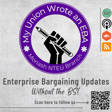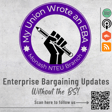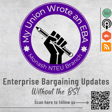Become a Creator today!Start creating today - Share your story with the world!
Start for free
00:00:00
00:00:01

Episode 13: State of the Uni w/ Ben Eltham
This episode, Kate & Tony pick Branch President Ben Eltham's brain on all the hot topics: the progress in bargaining (or lack thereof), what the strike looked like from up on the podium and where to next for industrial action at Monash. When the talking stalls, that's when we take to the street!
If you have questions about the process you'd like answered, or any topics you would like to hear covered on the podcast, drop us an email at myunionwroteaneba@gmail.com
You can also stay up to date with everything happening with bargaining at our new bargaining website, and with the branch on Facebook and Twitter. All of which can be found here - https://linktr.ee/myunionwroteaneba
Transcript
Introduction to Enterprise Bargaining Agreement at Monash University
00:00:18
Speaker
G'day, everyone, and welcome to My Union Wrote an EBA. This is a podcast to chronicle the progress towards a new enterprise bargaining agreement at Monash University and is brought to you by members of the Monash branch of the NTEU. We're here to take the old agreement and hashtag change it. And unlike our namesake, my dad wrote a porno to everything we can to avoid being fucked in the process.
Acknowledgment of Country
00:00:41
Speaker
Those involved with the podcast would like to acknowledge that it is being recorded on the unceded lands of the Kulin nations, on whose lands we live, teach and work. We would like to acknowledge and pay our respects to the traditional custodians and elders, past and present, and to the continuation of the cultural, spiritual and educational practices of Aboriginal and Torres Strait Islander peoples. Always was, always will be, Aboriginal land.
Financial Revelations: Monash's Strategies and Salaries
00:01:07
Speaker
Unfortunately this week, folks, we have to start the podcast with an apology.
00:01:11
Speaker
You say, unbeknownst to us, we've been inadvertently lying to you. At the start of this month, Monash released its 2022 annual report, and we learned some interesting things from it. We learned how many things Monash carved out of its calculations to make it appear as though it has no money. We learned that Monash has what it calls a confirmed bequest pipeline with, quote, an estimated value of $150 million to be realized for the university, which is a hell of a way to talk about waiting for people to die.
00:01:40
Speaker
But most importantly, on page 163 of the report, in a table of executive salaries, it notes that our vice chancellor has in fact been earning much more than what we thought she'd be. As you know listeners, at the beginning of each episode, we run through some stats. And one of those stats is how much the VC has made since the expiry of the last agreement. We've been basing that off of the last known figure, which was $1.2 million, already an enormous sum.
00:02:06
Speaker
Turns out though that she'd actually received a $150,000 a year pay rise, taking your annual salary to a minimum of $1,370,000 or roughly the combined yearly salary of US President Joe Biden, UK Prime Minister Rishi Sunak and her very own Prime Minister DJ Albo. In university worker terms, I would have to teach 8,970 hours of original tutorials
00:02:33
Speaker
which is the equivalent of teaching continuously for 374 days without stopping to make that much. Her salary would fund 26,910 consultation hours. And also important to note that for a lot of tutors, those consultation hours are currently not being paid.
Interview: Ben Altham on Bargaining and Industrial Action
00:02:54
Speaker
So with this updated data that we have, it's been 315 days since the last EBA expired. And in that time, the VC has been paid $1,185,345. So it turns out the VC passed that $1 million milestone way back at the end of March. And it's been 35 days since the pay offer from management that per year is less than half the pay rise that our VC got this year.
00:03:24
Speaker
astonishing. So this week on the podcast, we're speaking to Ben Altham, the NTU president and one of our bargaining team members. So first of all, we're going to talk about some bargaining stuff and some industrial action.
Challenges in Bargaining: Job Security and HR's Response
00:03:40
Speaker
All right, so straight in with the bargaining then. How's the bargaining been going, Ben? We had our most recent meeting on Tuesday, right? How'd that go?
00:03:48
Speaker
Yeah, thanks, Kate. Thanks, Tony. So bargaining is progressing. I guess it's fair to say we're still meeting. So we're still going in for meetings with Monash HR. But I wouldn't say that bargaining is exactly going great guns. And I wouldn't say the university is exactly giving us heaps of concessions and having a change of heart and deciding that they just really like what we're putting forward. It's very, very slow progress.
00:04:15
Speaker
The main news over the last couple of weeks is that the university has presented its views on what it considers to be improved job security. So they've come to us with a reasonably complex proposal on how they want to address what they acknowledge is a problem of widespread insecurity in their own workforce.
00:04:37
Speaker
The problem with what they are calling job security is that it's not very secure. So their view of what job security could be or better job security could be is basically a bunch of fixed term contracts, including what they call periodic academic employment. So these are a little bit like British style zero hour contracts.
00:04:59
Speaker
in the sense that they're flexible work, they have a fixed term, people's hours can go up or down but they are kind of employed by the university not as casuals. So they're not getting paid hour to hour like a casual would be and they do have some entitlements like they'll have some access to sick leave, some access to annual leave, not very much annual leave but a little bit
00:05:27
Speaker
they'll get more super. So there are some improvements in that respect. University is very pleased with that proposal. They think it's a big step forward, but we are rather less impressed than that. And we're still thrashing out the details of what they think that would look like. And that was a lot of what we talked about on Tuesday, actually.
00:05:53
Speaker
That's really disappointing to hear that the uni management isn't seeming to take jump security seriously and just sort of moving between modes of insecure work.
00:06:03
Speaker
Was there any things that we're waiting to hear from management, waiting for them to get back to us about certain claims or causes? Oh, so much. There's so much that we're waiting on still. We still haven't heard back from them about how many First Nations people they would like to employ as part of their Aboriginal and Torres Strait Islander commitments. We still haven't heard back from them
00:06:26
Speaker
on a range of issues that we've asked them about, like even just information requests that we made back in November about what the staff student ratios are at this university. They're basically refusing to give us information about that.
00:06:41
Speaker
We've made a series of proposals to the university for far better job security, for example, for the university to hire a thousand new ongoing staff. They did come back to us on that one and they said, no, that's just too hard. That's just way too many people that they have to hire.
00:07:01
Speaker
So it's a mix of we'll get back to you and outright knows on a lot of the proposals that we're putting forward. But even some of the stuff that they're putting forward, it seems to take them literally months between the time where they first raise it with us in bargaining and when they come back to us with the details of that. So it is still very slow progress. It's just that they're such a small underfunded organization, Ben. They can't do everything.
00:07:30
Speaker
That's right. I mean, Monash HR, I mean, there's only, I don't know, 500 of them or something. So, you know, and, you know, the university's got to continue on doing misconduct investigations and all the other things that Monash HR do, demanding people's union membership status after industrial action. So, yes, there's other things that go on in the background while they're negotiating the rights and conditions of every single employee at the university.
00:07:59
Speaker
Is there any way of us compelling them to give us the information that they've been holding out on or is that we just have to wait for their good graces to come around? We sent a formal information request in November and lots of that information they're still holding out on. So they're compelled under the Fair Work Act to bargain in good faith and that includes responding in a reasonable timeframe to reasonable information requests.
00:08:26
Speaker
Now, some of the things that we've asked for, they've simply said, well, that's not reasonable. That's not relevant. We don't have to tell you. But some of the stuff they're not even saying that they're not going to tell us, they're just telling us that they're still pulling it together. They still haven't got quite all the details in the right place.
00:08:45
Speaker
You know, haven't quite finished off the Excel spreadsheet. So, yeah, it does seem to me to be a little bit dishonest the way that they're treating us on this kind of stuff. And the reason we want this information, by the way, is it's really relevant because knowing what the staff-student ratios are, for example, in the university is super helpful because it helps us understand, for example,
00:09:08
Speaker
Is the university employing less teachers than it did four years ago?
Industrial Action and Strikes: Expressing Dissatisfaction
00:09:13
Speaker
Is the university's productivity improving? We know that it looks like their research productivity has increased quite significantly in recent years. Certainly the university's got a lot of research funding.
00:09:26
Speaker
You know, in many organisations when productivity increases, employees get a share of that increased productivity in the form of higher wages. So we'd like to know some of that detail for these negotiations. And maybe that's why the universities are reluctant to give it to us. We know at least one employee is getting a share of that.
00:09:52
Speaker
So talking about moving negotiations along, on the 3rd of May, all three of us, along with thousands of our colleagues from Monash and other Victorian universities, had a great time in the city for the strike and stop work. But then you were one of the people up on the podium that day in Solidarity Hall, and then up on the makeshift podium at the Eight Hour Monument. What was that like? And what were your takeaways from the day?
00:10:21
Speaker
Well, yeah, it was really amazing actually, thanks. Yes, I helped out with the MCing on the day at Solidarity Hall and then also put the motion for further industrial action on the steps of the 888 monument. And it was just an amazing feeling looking out over all those people gathered there. And I could see little pockets of Monash people and just friends actually scattered throughout the crowd.
00:10:49
Speaker
And it was a big crowd. I think at least a thousand people there on the day. So it was a very encouraging, very uplifting show of solidarity. I think a lot of us felt connected to some of our colleagues around the state. I saw people I'd worked with at Deakin before. I saw a lot of my colleagues from various parts of Monash Uni. And to get together and to talk about why
00:11:15
Speaker
universities are in trouble, you know, why has this sector become so corporatised? Why are they stealing from their own teachers, you know, these issues that confront us as a sector, and to have that kind of show of collective strength that was it was great, actually, you know, it was a really great feeling. Yeah, absolutely. I was there in the front row, as you know, then you could see me. And I could hear this sort of yelling from somewhere else.
00:11:44
Speaker
And I was like, oh, that's strange. There must be another rally going on. Not realizing that we had not only filled Solidarity Hall, the actual hall and the foyer, but there were so many people who were out on the street. And that's why we ended up having to do that motion at the front of the eight hour monument. But it was just a great day, so much fun. And yeah, like hanging out
Critique of University Management and Continued Action Plans
00:12:07
Speaker
with people, it was really wonderful.
00:12:10
Speaker
I mean, universities are big workplaces now, and there's a lot of us who work on them. They're pretty important parts of the post-industrial economy. And the staff in these places, they're not treated well by their managers. They've turned into almost like profit-seeking corporations, or certainly places that want to model themselves on profit-seeking corporations.
00:12:35
Speaker
And that kind of seeps into the way that they treat their staff. So I think people share a kind of view that universities in this country have lost their way. They've lost their moral purpose. They no longer act like colleges or places of education and learning. They're increasingly acting like
00:12:56
Speaker
you know, self-motivated, you know, almost psychopathic kind of organizations and the people reaping all the benefits of the people at the very top. So yeah, I think something's got to change and you can sort of see a groundswell of opinion and moving through just seeing so many people there marching and showing their disaffection. I thought it was really inspiring.
00:13:22
Speaker
Yeah, it was really good. And that's the first time since COVID that I've been back into the city for something like that. And it was good to remember that feeling of being around people and of doing something meaningful. Speaking of, and the motion that you put to the strike on the third about industrial action, what does that look like going forward for Monash? We've got stuff happening on the 16th, right?
00:13:50
Speaker
So we've got another stop work on the 16th this coming Tuesday. The idea of that is to keep the industrial action rolling. We did this big strike the first time that the university has gone out on strike in more than four years.
00:14:08
Speaker
but you'd think that maybe that would have an impact or that the university would want to get in touch to discuss why so many employees upset but nothing like no like just crickets right like so yeah i mean i think we just need to keep the pressure up it's not going to be one in a day and so that's why we're going to keep rolling with the industrial action so on tuesday we're talking about
00:14:34
Speaker
like a rolling rally basically we're going to have some people turn up at Clayton campus from 10 30 a.m and then we're going to move to having a discussion with members and then we're going to have a bit of a picnic lunch hopefully if the weather holds but we've got some indoors options as well
00:14:54
Speaker
So it'd be about three hours of rolling, stop work, industrial action, and that's once again to send a message that staff aren't happy, that negotiations aren't progressing the way we want them to, and that we need management to actually come to the table. Ultimately, what we want is for
00:15:15
Speaker
The big bosses, the real managers to actually get involved in these negotiations and so we can have real discussions with the actual people who run this university. They're still insisting that all negotiations be directed through Monash HR.
00:15:31
Speaker
That's not particularly productive in our opinion because those are not the people who make the decisions. And I think it just shows in general the university has a pretty contemptuous attitude to it, the way it talks to its staff. This place doesn't consult, it takes decisions and then it informs staff that the decisions have been taken, but there's very little ability for staff to actually feed back to the big bosses about how this place is run. And that's why the industrial action is so important.
00:16:01
Speaker
Yeah, great. Well, I look forward to seeing you two and all the listeners there. Always feel free to come up and say hello and have a chat to us, particularly if, you know, you're coming to strike by yourself. We're always up for a chat and say hello and all that kind of stuff. And just like to say as well, thanks very much for coming on the podcast today, Ben. And, uh, thank you. Yeah, it's been so good.
00:16:28
Speaker
Thanks very much, Ben. And if anyone has any questions about industrial action or about the EBA, please feel free to shoot us an email at myunionrodeneba at gmail.com. And we'll see you all on the 16th of May. All right, folks, that's it for this episode. Thanks to Kate, Danny, Adam, Bernard, and Poddaddy Sofio for all the work they've put into this. And we'll catch you next time.
00:16:58
Speaker
What?


